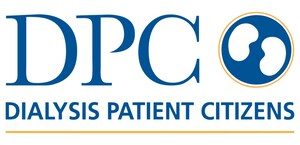
Dialysis Patients Need Bone & Mineral Metric
WASHINGTON, Aug. 30, 2013 /PRNewswire-USNewswire/ -- Dialysis Patient Citizens (DPC) released additional information today from its Annual Membership Survey, conducted by global market research firm Ipsos. The survey reported that 85 percent of DPC's membership relies on phosphate binders and 22 percent relies on calcimimetics, both used for the treatment of Bone and Mineral Metabolism (BMM) disorder that occurs with the loss of kidney function. "With so many dialysis patients relying on phosphate binders and calcimimetics to help maintain their health, the addition of patient access protections and quality performance measures around the treatment of BMM are critical as these drugs are added to the End Stage Renal Disease (ESRD) bundled payment system," said Hrant Jamgochian, executive director of DPC.
BMM disorder is associated with increased mortality and morbidity and its treatment is important in improving the quality of life and longevity of dialysis patients. Dialysis patients require the clinical management of phosphorus, calcium and parathyroid (PTH) levels, and large prospective studies have shown that lower mortality is observed when all three parameters are managed to target ranges established by national clinical practice guidelines.
The Centers for Medicare and Medicaid Services (CMS) is currently revisiting quality performance measures for the ESRD Quality Improvement Program (QIP). As a result, CMS is proposing to add hypercalcemia as a clinical measure in the QIP, to the current requirement that dialysis centers report lab values for patients' serum phosphorus, which started on January 1, 2013. "DPC commends CMS for proposing to include BMM measures in the QIP," said Jamgochian. "There is no better time to add such important patient protections."
DPC also encourages CMS to adopt broader patient protections into the ESRD bundle requirements that are currently in place in the Medicare Part D prescription drug program. Such protections should include:
- requiring that more than one drug is available within a therapeutic class, to help ensure that patients are not pushed to the least expensive medication without an alternative;
- ensuring accessibility to an appeals process for patients needing other pharmaceutical options, in case patients are denied access to the treatment that is best for them;
- preserving the annual drug utilization review, so that if medications are changed pharmacists first look at any potential drug interactions; and
- adding geographic access standards to make sure patients don't have to travel far if a dialysis facility contracts with a brick and mortar pharmacy.
"Dialysis patients need protections in place for good patient care, which includes safe BMM levels as well as Part D consumer protections," added Jamgochian.
About Dialysis Patient Citizens
With more than 26,000 dialysis and pre-dialysis patients making up our membership, DPC is working to improve the quality of life for all dialysis patients- through education and advocacy. We are a nationwide, nonprofit, patient-led dialysis organization with membership open only to dialysis and pre-dialysis patients and their families. Our policies and our mission are guided solely by our membership.
DPC is a 501(c)(4) organization governed by dialysis patients.
http://www.dialysispatients.org
Contact
Hrant Jamgochian, J.D., LL.M.
Executive Director
Dialysis Patient Citizens
122 C Street NW, Suite 510
Washington, DC 20001
Phone: 202-789-6933
Toll free: 866-877-4242
Mobile: 202-215-1800
FAX: 202-789-6935
SOURCE Dialysis Patient Citizens






Share this article